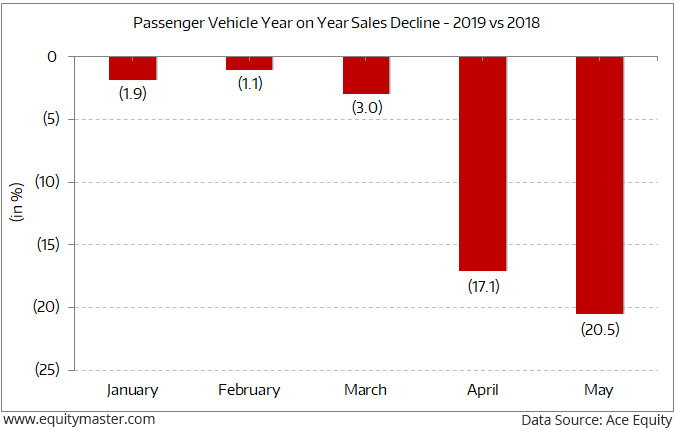- Home
- Todays Market
- Indian Stock Market News June 17, 2019
Sensex Slips 300 Points; Tata Steel & Vedanta Top Losers Mon, 17 Jun 12:30 pm
Share markets in India are presently trading on a negative note. Barring IT sector, all sectoral indices are trading in red with stocks in the metal sector, energy sector and telecom sector witnessing maximum selling pressure.
The BSE Sensex is trading down by 305 points (down 0.8%), while the NSE Nifty is trading down by 101 points (down 0.9%). The BSE Mid Cap index is trading down by 0.8%, while the BSE Small Cap index is trading down by 1%.
Speaking of Indian markets, notably, Indian markets have been on the rise since the Narendra Modi-led coalition won a massive mandate to form the government for the second consecutive time.
In May, the benchmark Sensex rose 1.8%. In the year so far, Sensex has gained over 10%.
So, by the next elections in 2024, will Sensex touch 1,00,000 mark?
Does Sensex 1,00,000 sound outrageous from where we are right now?
Even Sensex 40,000 would have seemed the same from around 5,000 levels in May 2004.
History indicates a healthy rise in Sensex post elections. In the three elections prior to this, we have seen a government come back to power, and change hands but the Sensex has moved one way i.e. upwards.
And now, with a stable government at the centre, the pace might pick up.
Co-head of research, Tanushree Banerjee believes there are 50 irreversible trends that will the push Sensex to 1,00,000.
And these 50 trends look set to play out soon. The ride might have already begun looking at the stock market's reaction to the election results.
But it is still early days. And the time to hop on to the ride is right now!
In the news from the currencies space, the rupee weakened against the US dollar in early trade today, tracking the losses in other Asian currencies.
On Friday, the domestic currency slipped 30 paise to end at 69.80 against the US dollar on the back of increasing crude oil prices which kept the investors cautious.
To know more about commodity and currency markets and which are the best counters to trade in this space, you can read Vijay Bhambwani's recent article: Why Do I Recommend Trading Only Nickel, Crude oil, Gold, Copper, and USDINR?
In the news from the finance sector, shares of Shriram Transport Finance plunged nearly 8% today after Piramal Enterprises share price sold its entire stake in the company via multiple block deals.
Reportedly, Fidelity, Eastspring and SBI MF are the likely buyers of the shares.
In a BSE filing, Piramal Enterprises said that the company has sold its entire direct investment of 9.96% in the fully paid-up share capital of Shriram Transport Finance Company to third-party investors.
In December 2014, Piramal Group picked up US-based private equity investor TPG's 9.9% stake in Shriram Transport through block deals in the open market for Rs 16.5 billion.
Shriram Transport Finance share price is presently trading down by 5%.
Moving on to the news from the automobiles sector, according to a report by the Federation of Automobile Dealers' Associations (FADA), retail auto sales in May that fell 7.5% from a year ago show that the overall consumer sentiment is poor. Latest data shows that production cuts will continue as retail demand continues to falter.
As per an article in a leading financial daily, auto sales have been falling prompting manufacturers to cut production to align supply with retail demand and existing inventory with dealers.
After the growth in January, auto sales growth has declined every month. Rating agency CRISIL share price pegs FY20 growth at 3% for passenger vehicles (PVs) and two-wheelers and 6-8% for commercial vehicles (CVs).
Note that, passenger sales fell 20.5% in May 2019 compared to May 2018. This follows a 17.1% year on year decline in April as well.
The decline in May is the worst seen since 2001.
Never Ending Woes For The Automobile Sector
Here's what Tanushree Banerjee wrote about it in one of the recent edition of The 5 Minute WrapUp...
- Multiple factors have affected the auto sector of late.
The liquidity crisis faced by NBFCs, regulatory changes leading to increased costs, new emission norms... they have all taken their toll.
Also, this sector is ripe for disruption with electric vehicles and ride sharing applications.
Maruti, India's largest car maker announced it would stop making diesel cars from April next year.
The coming one year will be a real test for India's auto companies.
It will also tell us if this slowdown is temporary or if there has been a structural change in the sector.
There is one thing I know for sure, dear reader. Only the ones adapting their business models to the rapidly changing environment will survive and thrive.
To know what's moving the Indian stock markets today, check out the most recent share market updates here.
For information on how to pick stocks that have the potential to deliver big returns, download our special report now!
Read the latest Market Commentary



Equitymaster requests your view! Post a comment on "Sensex Slips 300 Points; Tata Steel & Vedanta Top Losers". Click here!
Comments are moderated by Equitymaster, in accordance with the Terms of Use, and may not appear
on this article until they have been reviewed and deemed appropriate for posting.
In the meantime, you may want to share this article with your friends!